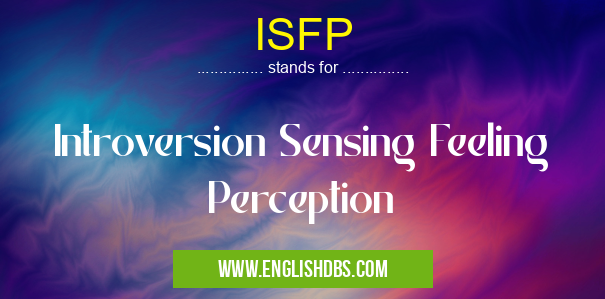What does ISFP mean in UNCLASSIFIED
The acronym ISFP stands for Introversion, Sensing, Feeling and Perception. It is one of the sixteen personality types described by the Myers-Briggs Type Indicator (MBTI). ISFPs are often referred to as “adventurers” because they thrive on new experiences and live life passionately and adventurously. They like to explore their environment, both inner and outer, while staying in tune with their feelings. They also take a great interest in people's lives and can be quite caring, understanding individuals.

ISFP meaning in Unclassified in Miscellaneous
ISFP mostly used in an acronym Unclassified in Category Miscellaneous that means Introversion Sensing Feeling Perception
Shorthand: ISFP,
Full Form: Introversion Sensing Feeling Perception
For more information of "Introversion Sensing Feeling Perception", see the section below.
Essential Questions and Answers on Introversion Sensing Feeling Perception in "MISCELLANEOUS»UNFILED"
What is the meaning of ISFP?
ISFP stands for Introversion, Sensing, Feeling, and Perception. This 4-letter acronym is commonly used to denote the Myers-Briggs Personality Type Inventory (MBTI) type that describes a person’s preferences in thinking, perceiving, and relating to the world around them.
How can I identify if I am an ISFP?
There are several ways to identify if you are an ISFP. The most common way is by taking the MBTI test, which consists of a series of questions designed to measure psychological preferences. Additionally, you can look up resources online that explain specific traits and characteristics associated with being an ISFP.
What do ISFP personalities tend to be like?
People who identify as having ISFP personality types are often described as creative, compassionate individuals who appreciate their surroundings on a deep level. They tend to be spontaneous and unpredictable in their behavior and choices. Additionally, they are highly independent individuals who define themselves in terms of their own values and feelings.
How do ISFPs handle stressful situations?
Since they feel so deeply about any given situation, stress or conflict can be particularly difficult for the ISFP personality type to manage. In these situations it is important for them to take a step back and gain perspective before confronting the issue head-on. It can also help for them to take time alone away from the situation in order to help process their feelings more effectively.
How does an ISFP act when they're feeling happy?
When feeling happy or contented with life, an individual of this personality type may exhibit some typical behaviors that stand out from other personalities. These can include being easily engaged with others; being more spontaneous; being open-minded when it comes to trying new activities; expressing themselves freely through art or music; adopting a “go-with-the-flow” attitude; and maintaining a lively presence in social interactions.
How do ISFPs get along with other personality types?
Generally speaking, people of this personality type get along very well with those who have similar preferences – particularly those within the Feeling category such as ESFJ or INFJ types – as they appreciate each other’s sensitivity and willingness to empathize with one another’s emotions. That said, they also find strong ties with those who are more opposite from themselves such as INTJ or ESTP types; even though they may clash at times due different perspectives on life matters, these differences often lead to mutual growth opportunities.
What kind of career might suit an ISFP best?
Individuals of this personality type have been known for excelling careers in fields where creativity and self-expression are valued - such as art direction/illustration; graphic design; fashion design; photography; music performance/production/composition; writing/journalism/publishing; counseling services; hospitality management etc. As long as there is enough space granted for personal freedoms during working hours then many professions can suit this type well.
What should you keep in mind when giving advice to someone who is an ISFP?
Since people belonging below personality type tend focus heavily on their emotional states while making decisions - it would be wise not try push too far ahead when giving suggestions regarding future plans or actions - especially without considering how said changes could affect their current emotional state at any given moment e.g.: Keep suggesting break up ideas only after proper discussion about how both parties may feel once that decision is made etc.
Are there any potential weaknesses associated with having an ISFP personality type?
Yes - like any group - people belonging within this spectrum face certain challenges which stem from both external issues (e.g.: lack confidence due social anxiety) and internal ones (e.g.: difficulty managing strong emotions & impulses). However - depending on the situation at hand - many learn how channel each challenge into strengths overtime e.g.: fearlessness while trying new experiences etc.
Final Words:
In conclusion, ISFPs make life exciting as they live it passionately through exploration, risk-taking behaviors, and an unwavering commitment to staying true to themselves throughout the process. Their appreciation for others' unique perspectives allows them to build strong connections with those around them - often leading into meaningful friendships that stand the test of time!
